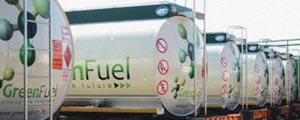
The adoption of mandatory blending of ethanol by some economic powerhouses could have come as a rude awakening for Zimbabwe’s capital-starved government. Report by Bernard Mpofu Chief Business Reporter Locally, a similar project had been put on hold amid growing controversy over its implementation.
When Zimbabwe resumed production of biofuels extracted from ethanol following an estimated $600 million investment, many would have thought that the multi-million dollar project in Chisumbanje would have attracted huge foreign currency inflows through exports.
Fuel imports, according to government figures, have now emerged as one of the main drivers of the country’s import bill expected to balloon to $8,2 billion this year, which represents 75% of the gross domestic product.
The production of the fuel was also seen as a panacea to the country’s employment problems and perennial foreign exchange shortages.
Subsequently, as the project grew, businessman Billy Rautenbach would emerge as one of the most powerful barons in the country. This development, despite Rautenbach widely seen as a close ally of President Robert Mugabe, could have obviously raised security concerns.
Last week, a Cabinet inter-ministerial committee report on the Chisumbanje ethanol project exposed that the Rautenbach-promoted project misrepresented facts and abused the local community and endangered livestock.
The Cabinet committee, clearly aware of such implications, proposed a raft of changes, which included altering the ownership structure of the ethanol project.
The ethanol project is a partnership between the Agricultural and Rural Development Authority (Arda) and Rautenbach’s Rating and Macdom Investments in a 20-year build-operate-and-transfer (BOT) arrangement to transform estates at Chisumbanje and Middle Sabi. Under the proposed new structure, the government is now expected to own its stake through a joint venture (JV).
- Chamisa under fire over US$120K donation
- Mavhunga puts DeMbare into Chibuku quarterfinals
- Pension funds bet on Cabora Bassa oilfields
- Councils defy govt fire tender directive
Keep Reading
“The Cabinet decision to convert the project from a BOT to a JV must be upheld and implemented within the proposed timeline of two months.
“It must be noted that Ethanol plant is not on Arda land, and was not part of the BOT, which means this BOT arrangement was actually detrimental to the national interest,” reads a report compiled by the inter-ministerial committee.
“In doing the BOT conversion to JV due-diligence and investment/project valuation, there is need for rigour and creativity.
“The veracity of the claim that $600 million has been invested must be established, including the source of the financing.”
The launch of E10, a blended ethanol fuel, came with pomp and fanfare. Many service stations were branded with the product’s logo. Motorists shunned the fuel, saying it was uncompetitive despite it being considered environmentally friendly. Questions on its pricing model took centre stage when production stalled.
GreenFuel, suppliers of the biofuel, went into overdrive garnering support for mandatory blending. The campaign then divided the government with some sections accusing Energy minister Elton Mangoma of sabotaging the project along party lines.
Fresh divisions emerged in the fragile inclusive government.
While political parties were publicly trading accusations and counter-accusations, a Cabinet inter-ministerial committee was carrying out an investigation into the project after production of the fuel had stalled.
According to the National Energy Policy launched recently, the government targets to reach levels of mandatory blending of 20% by 2015. The committee advised government to gradually adopt this policy rather than to do so hastily. Debate on the pricing of the fuel, whose difference with unleaded petrol was marginal despite the relatively lower cost of production, also caught President Robert Mugabe’s attention.
Mugabe, like his political archrival Prime Minister Morgan Tsvangirai, was quoted at the recently held Research and Intellectual Expo saying E10 was overpriced.
His remarks clearly vindicated Mangoma.











